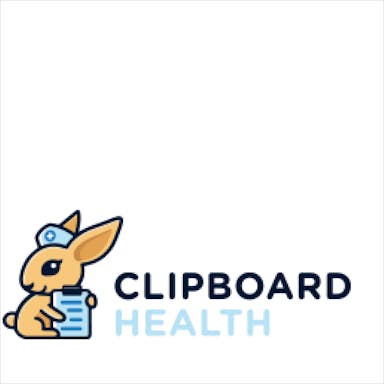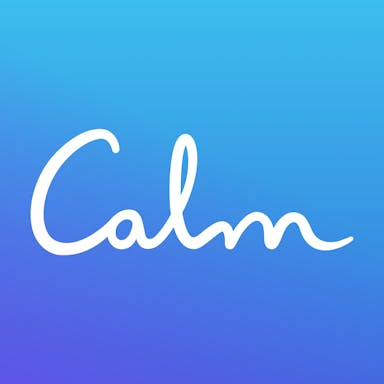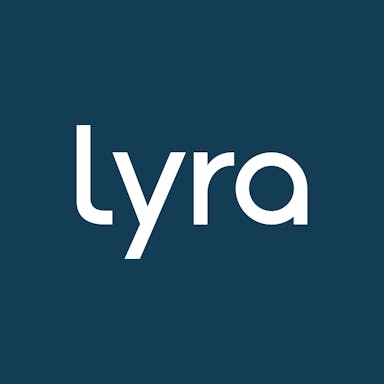Thesis
Mental health is becoming an increasing focus globally, with 10.7% of people around the world having experienced a mental health disorder in 2017. In the United States, 1 in 5 adults deal with mental illness every year. With high reported rates of mental illness has come increased focus and awareness around mental health, but there is still a large gap in treatment; 28% of US adults afflicted by mental illness were not able to receive the treatment they needed.
Businesses are not insulated from this when it comes to their workforce, and mental health is an area of greater awareness for employers. In 2021, mental illness issues were estimated to cost employers $2K per employee per year due to absenteeism and unnecessary turnover, and the total costs of mental illness were estimated to cost more than 4% of global GDP. Employees are also frequently leaving their jobs for mental health reasons. In 2021, 68% of Millennials (50% in 2019) and 81% of Gen Zers (75% in 2019) left roles for mental health reasons. These costs create a strong incentive for businesses to invest in employee mental health, which is partially why the global behavioral health software market is expected to reach $5 billion by 2026.
Modern Health is a mental well-being platform enabling companies to offer therapy, coaching, and self-guided courses to employees. The platform combines a WHO well-being assessment to help triage users, self-service wellness kits, a network of certified coaches, and licensed therapists — all available in 50+ languages. Its digitized care offerings are meant to increase the accessibility of mental health services. To differentiate itself from many incumbent healthcare providers, Modern Health seeks to engage employees across various care modalities, not just high-cost therapy.
Founding Story
Modern Health was founded in 2017 by Alyson Friedensohn Watson and Erica Johnson in San Francisco, California. Alyson is the current CEO, whereas Erica Johnson, formerly CTO, is no longer with the company and has since gone on to co-found a philanthropic venture called the Jersin Foundation.
Before starting Modern Health, Watson held leadership roles including health industry strategy consulting at PwC, healthy behavior change management at Keas (acquired by Welltok), and partner point solution integrations at Collective Health. She graduated from Johns Hopkins University with a global environmental change and sustainability degree. Johnson, meanwhile, has a neurobiology research and engineering background from her experiences as a Research Specialist at UC Berkeley’s Neuroscience Institute, Product Manager at the University of California, San Francisco, and Engineering Leader at Stanford University School of Medicine.
In 2017, Watson realized that there was room for a service to help corporations provide better mental healthcare for their workforce given the amount of time employees spend at work. This realization laid the groundwork for what would become Modern Health.
Watson reportedly fired Johnson in 2019. Johnson sued Modern Health and Watson for breach of contract, wrongful termination, relation, and defamation. An additional reason for the suit was a claim that Watson made false statements to potential customers. The company denies all claims and created a 102-page report based on an internal investigation by its board, clearing its CEO of any misconduct. It is unclear what effects, if any, Modern Health as a business has suffered from this ongoing legal situation.
Product
Mental health care delivered through apps can be broken down into three different categories: mental disorder apps to fight serious illnesses, mental self-improvement apps to resolve stress or anxiety, and multipurpose mental health apps to address both use cases mentioned above. Modern Health falls into the last category, as a B2B app that packages several forms of care for members.
Modern Health’s comprehensive mental health and wellness platform combines the WHO well-being assessment to triage members, self-service wellness kits, certified coaches, and licensed therapists, all available within a single app. Mental health care has quickly become a normalized and necessary perk of most companies, with 95% of large employers now providing access to virtual counseling, up from 69% in 2020.
Modern Health operates a B2B2C model, offering solutions for organizations including employers, providers, small & medium businesses, and large enterprises. Employers have access to an Insights Hub which provides a centralized place to manage access to care for their workforces, while employees of organizations using Modern Health have access to a number of product offerings including one-on-one care, community care, and self-help.
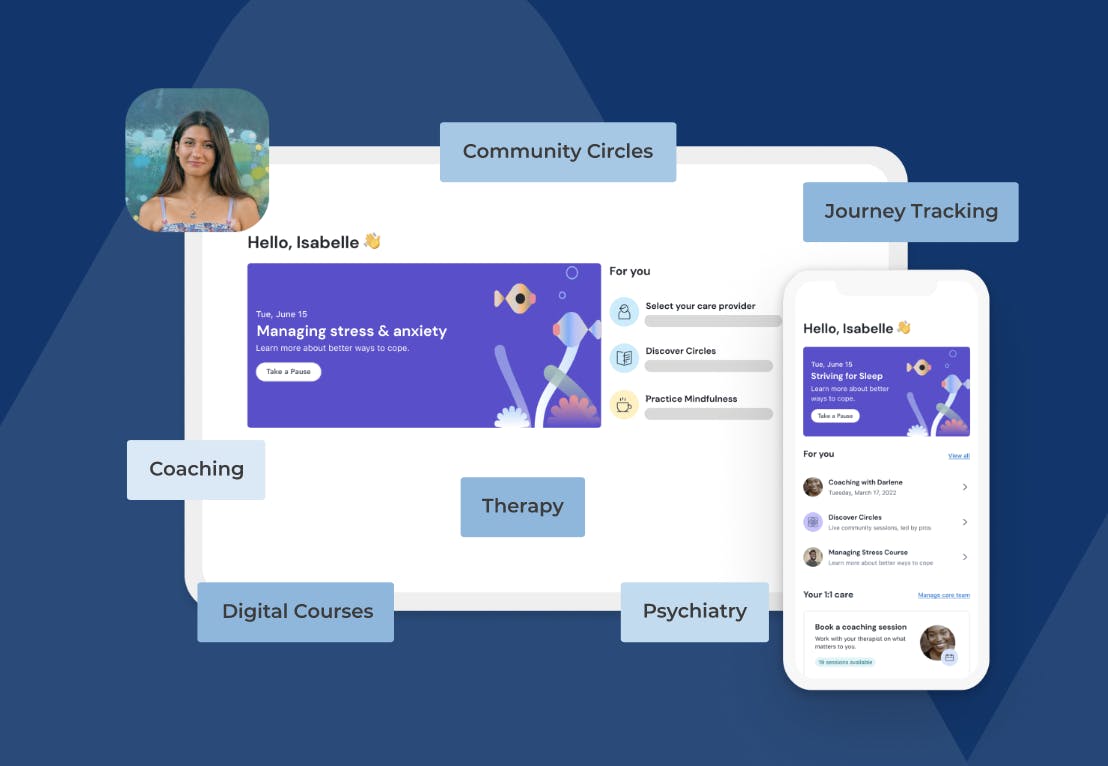
Source: Modern Health
Workplace Well-Being Suite
Modern Health aims to help companies ensure employees are supported at every step of their mental health journey. It helps companies personalize care for all employees by providing access to therapy, coaching, and self-guided or community-based support.
For employers, Modern Health’s Insights Hub also offers businesses a centralized portal to manage access to care, identify at-risk populations, and extend targeted support to their workforce. This includes on-demand reporting that displays key metrics on health and well-being, areas of need, and utilization of care across office locations and departments. In addition, it offers over 150 resources for managers, ERGs, and other leadership, as well as access to Client Success and Marketing partners who can help craft strategies for adoption.
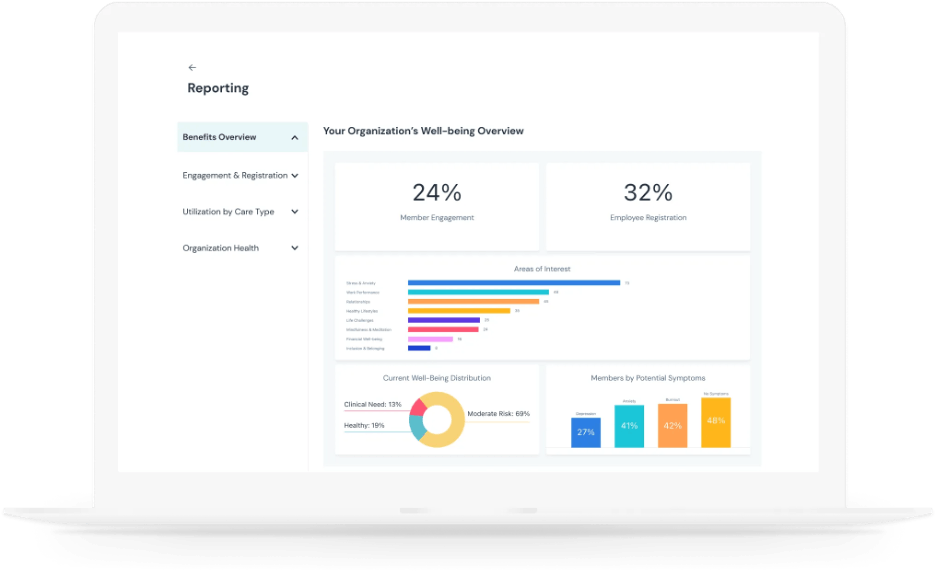
Source: Modern Health
One-on-One Care
Modern Health’s one-on-one care offering includes coaching, therapy, and psychiatry services. Members can match with a provider in minutes and access support through live video sessions and secure messaging via the app.
A global network of clinical therapists is available to assist with a variety of mental health needs, such as depression, anxiety, and trauma. Psychiatry & medication management is also available through psychiatric practitioners that can help assess and prescribe medication where appropriate, and help with tracking progress.
Mental health coaches can also help with managing stress or burnout, while specialty coaches can focus on needs centered around general career development, financial well-being, relationships, and healthy habits. Modern Health’s clinical research team reported that 46% of members beginning care with depressive-related symptoms showed clinically relevant improvements in their well-being.
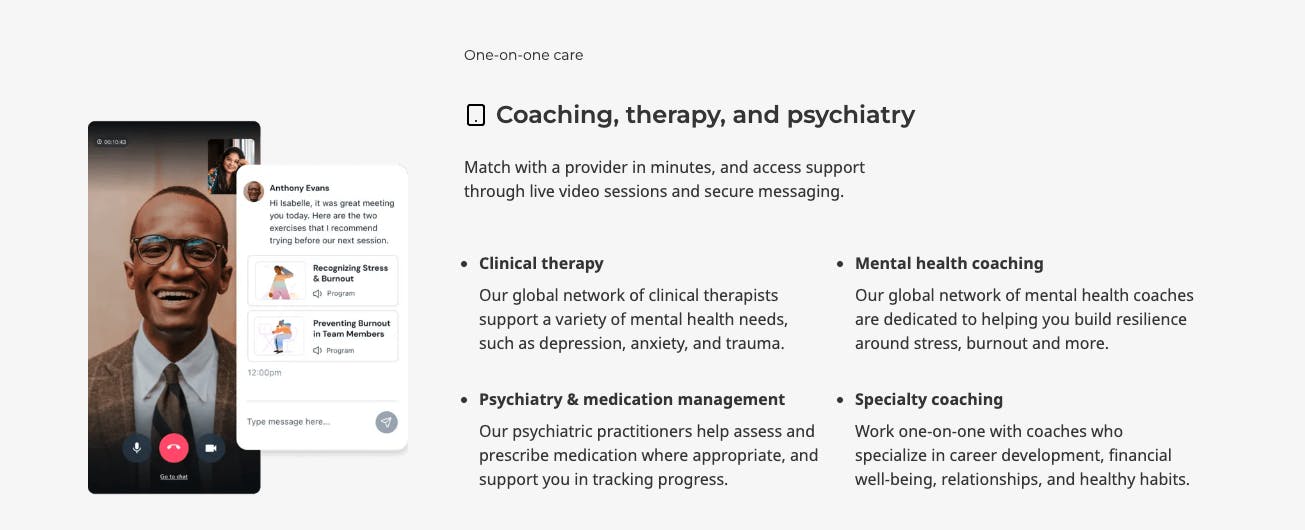
Source: Modern Health
“Circles” Community Care
“Circles” are live community group sessions led by therapists and coaches, many of which are free and open to the public. “Discussion Circles” provide a space for members to share and connect with others, while “Listen & Learn Circles” allow participants to have access to expert opinions on navigating challenges.
“Skill-Building Circles” are workshop-style sessions that provide concrete tips and skills for members to put into action, and “On-Demand Circles” are resources from group sessions that are available on-demand for users. This product seeks to create a sense of a virtual community for its users, as well as for people outside of the platform, free of charge. Circles offer the opportunity to learn, share ideas, and allow employers to pay to bring private Circles to their companies.
Modern Health was recognized in Fast Company’s World Changing Ideas in 2021 in the Health category due to the introduction of its “Circles” product as a novel approach to the digitization of group therapy.
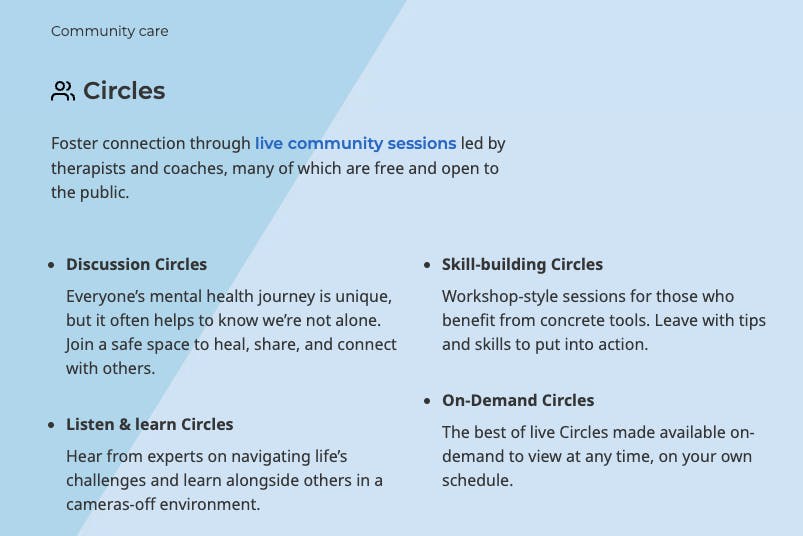
Source: Modern Health
Self-Guided Care
Modern Health provides wellness material via a robust library of interactive audio and video content, with new resources added regularly. A “Daily Pause” feature encourages bite-sized exercises for a few minutes each day. Various programs include interactive exercises and podcasts on topics like developing a stressless nighttime routine and managing depression.
There are also several courses that provide self-paced and structured lessons, developed and led by clinical therapists. Mindfulness exercises (which have risen in popularity since 2010) such as meditations, breathing exercises, and soundscapes are offered to help manage stress, develop mindfulness, and improve sleep.
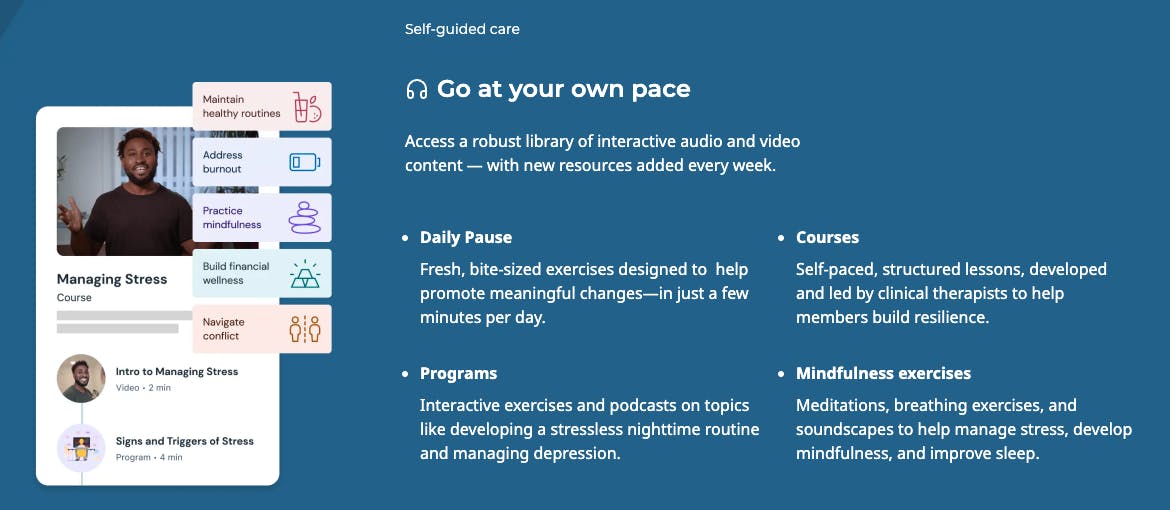
Source: Modern Health
Specialized Care
Modern Health also provides specialized care, such as local crisis resources, work-life supervisory care, family care, and continuity of care.
Market
Customer
Modern Health’s target customers include employers looking to provide benefits for their employees and consultants looking to provide benefits to their clients. It aims to provide affordable and accessible mental health care to organizations. Some notable customers include Eventbrite, Lyft, Zendesk, and Dropbox. Its product offerings also cater to those who prefer or only have access to online and remote mental health support over traditional in-person therapy.
Market Size
The global behavioral health software market is expected to reach $5 billion by 2026, with growth driven by increasing awareness and acceptance of mental health challenges. With 10.7% of people globally experiencing a mental health illness, there is a large potential customer base among employers who are looking to mitigate the high costs that are associated with a workforce that does not have adequate mental health support.
Competition
Lyra Health: Lyra Health helps companies improve access to effective, high-quality mental health care for their employees. It was founded in 2015 and has raised $910 million in funding. More than 300 companies work with Lyra Health to offer mental health benefits to their employees, including Meta, Pinterest, and Starbucks, giving more than 13 million people access to care. Like Modern Health, they support in-person, virtual, and self-guided care.
Ginger: Ginger is an on-demand mental health platform providing individuals and organizations with virtual therapy, coaching, and psychiatry services. The company was founded in 2011 and has raised over $220 million in funding. Like Modern Health, Ginger offers a comprehensive mental health platform that is strictly virtual, whereas Modern Health offers in-person therapy options. It merged with direct-to-consumer mental health provider Headspace in 2021.
Spring Health: Spring Health is a mental health platform that provides personalized mental health solutions to employers and their employees. The company was founded in 2016 and has raised over $295 million in funding. Spring Health differentiates itself from competitors by offering personalized mental health solutions using predictive AI. This is similar to Modern Health’s efforts in personalization. Still, Spring Health’s user experience caters heavily to high clinical needs through therapy and medication. In contrast, Modern Health tends to drive higher overall employee utilization since it addresses a spectrum of needs from preventative self-care to clinical support through therapy, coaching, digital programs & courses, and community “Circles”.
Calm: The direct-to-consumer mental wellness app Calm has a B2B vertical called Calm Business is a solution designed with employees in mind — meant to improve their productivity, workplace engagement, and overall well-being. Over 3K organizations work with Calm Business in supporting 20 million+ employees across the globe. With Calm Kids, the product enables employees to introduce Calm to their children through weekly sleep stories, meditations, lullabies, and music featuring characters such as Peppa Pig, Kung Fu Panda, Thomas & Friends, and the Minions. Calm was founded in 2012 and has raised $218 million in funding.
Talkspace: Talkspace is a platform that connects individuals with licensed therapists through messaging, video, and audio sessions. The company was founded in 2012 and has raised $413 million in funding. Talkspace for Business enables companies to offer self-guided courses, therapy, and psychiatric care to their companies.
Business Model
Modern Health offers a subscription-based platform to organizations looking to support their employees' mental health and well-being. It makes money by charging organizations a fee for access to its platform, which is determined by the organization's number of employees and the services they require from the product suite. Modern Health is a relatively asset-light business.
The company's platform is entirely digital and does not require significant physical infrastructure. However, Modern Health does pay employees who provide clients with coaching and therapy services.
Traction
Once an organization becomes a customer, Modern Health has reported high rates of utilization of its service. A survey conducted by Modern Health claimed to find that 27% of all eligible members of customer organizations registered with Modern Health, 54% engaged with care, 39% used self-serve digital content, 31% participated in at least one coaching session, and 11% participated in at least one therapy session. Modern Health has worked with over 200 business clients, including Electronic Arts, Lyft, and Pixar as of February 2021.
Valuation
Modern Health's most recent funding round was a $74 million Series D round that closed in September 2021. The round was led by Founders Fund with participation from Lachy Groom. This latest raise brought Modern Health’s total funding to more than $170 million and its valuation to $1.2 billion, making it the fastest female-founded company in the U.S. to reach unicorn status.
Key Opportunities
Personalization
Modern Health acquired Kip, a behavioral health startup with a goal of bringing accessible and data-driven mental health care to clients worldwide, in 2021. Modern Health stated that “the addition of Kip’s comprehensive and evidence-based communication, assessment, and analytics tools will allow Modern Health to better track and analyze outcomes and feedback over time, create more meaningful, personalized care plans, and further strengthen relationships between Modern Health’s therapists and coaches and the members they serve.” One of Modern Health’s assets is its ability to personalize care based on individual well-being and needs — analytics could play a role in this triaging process, especially if they invest in even more new technology. Another potential use case for improved analytics is providing employers with insights through Modern Health’s existing Insights Hub.
Community Groups
With an 88% fill rate across Circles within the first week of launching and 80% of attendees saying that the sessions gave them actionable steps to improve their mental health, there is an opportunity to create community among users further and generate more usage for Modern Health. In 2022, 50% of people mentioned Circles was their first interaction with the Modern Health platform, and of those, around 50% went on to use the platform for more resources. Modern Health capitalized upon this potential growth by launching more language support for this product. In 2022 alone, the company hosted over 1.5K Circles led by providers who spoke 23 languages in 21 countries, reaching over 36K people. This product is one to watch.
Key Risks
Frequency of Job Switching
One pitfall of mental health apps across the board is poor sustained engagement and high attrition rates, with 39% of digital mental health interventions discovering significant attrition. Gen Z is changing jobs at a rate 134% higher than in 2019, and millennials are 24% more likely. This creates a struggle for Modern Health as a B2B2C company that offers its products via employers. Modern Health might lose users who move to a company without its services, many of which require time to collect meaningful data and create lasting change. People prefer to use consumer products that can stay with them throughout their careers.
Summary
Mental health care continues to grow as a pain point across industries and communities. One unique attribute of this industry is that times of hardship, such as the 2020 pandemic, may result in an increased user base and opportunity for innovation. If Modern Health continues to expand its product features to exceed industry standards and create new solutions to add to its existing comprehensive suite, it could become the leader in a small but crowded space.




